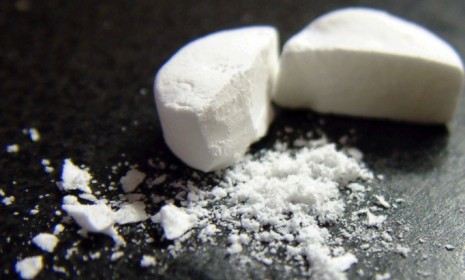Can Ecstasy help veterans fight off post-traumatic stress disorder?
A new follow-up study shows long-lasting improvement for soldiers given MDMA during psychotherapy

A free daily email with the biggest news stories of the day – and the best features from TheWeek.com
You are now subscribed
Your newsletter sign-up was successful
The question: Can MDMA, better known as Ecstasy, help soldiers coming home from Iraq and Afghanistan combat war's psychological toil? Ecstasy is experiencing a renaissance among young party-goers thanks to a resurgent rave scene. But the popular drug, which can induce brief flashes of euphoria and temporarily make users more affectionate, has also been the focus of a controversial psychotherapy experiment to help war veterans cope with post-traumatic test syndrome, or PTSD. A new study published in the Journal of Psychopharmacology by husband and wife team Michael and Ann Mithoefer investigates the long-term effectiveness of Ecstasy as an anti-PTSD tool.
How it was tested: In the original trial, 20 patients with PTSD who had proven unresponsive to conventional psychotherapy were given either MDMA or a placebo as part of their therapy sessions. These sessions were long, lasting eight hours each. More recently, the researchers checked in with the subjects.
The outcome: The original results showed that patients given Ecstasy were more responsive, posting a "spectacular" 85 percent response rate, says Arran Frood at Nature. (The placebo group hovered at 30 percent.) According to researchers, the MDMA "decreases levels of fear and defensiveness and increases trust between patient and practitioner when used in a clinical setting." In the recent follow-up study, only two participants from the MDMA group had relapsed. No one who took part in the study reported any ill effects from taking the drug.
The Week
Escape your echo chamber. Get the facts behind the news, plus analysis from multiple perspectives.

Sign up for The Week's Free Newsletters
From our morning news briefing to a weekly Good News Newsletter, get the best of The Week delivered directly to your inbox.
From our morning news briefing to a weekly Good News Newsletter, get the best of The Week delivered directly to your inbox.
What experts say: "We've now shown that the results from the initial study were not some transitory and superficial afterglow," said study author Rick Doblin, founder of the Multidisciplinary Association for Psychedelic Studies in Santa Cruz, Calif., which funded the husband and wife team's research. But not all experts consider the results substantive. Jennifer Wild, a consultant clinical psychiatrist at King's College London, argues the small sample size means the placebo effect cannot be ruled out, and notes that, at the time of the follow-up study, eight of the participants were still in psychotherapy and 12 were still on psychiatric meds. "That's quite a lot in my opinion," she tells Nature. "Ordinarily when people recover they don't have further treatment."
What the soldiers say: "I feel survivor's guilt, both for coming back from Iraq alive and now for having a chance to do this therapy," Anthony, a 25-year-old veteran who asked that his last name not be used, tells The New York Times. "I'm a different person because of it." There is now "an evidence base for this MDMA therapy and a plausible story about what may be going on in the brain to account for the effects," says Brig. Gen. Loree Sutton, a psychiatrist who recently retired from the Army. When it comes to the mental well-being of those who serve, "we should leave our politics at the door and not be afraid to follow the data."
A free daily email with the biggest news stories of the day – and the best features from TheWeek.com
-
 Political cartoons for February 21
Political cartoons for February 21Cartoons Saturday’s political cartoons include consequences, secrets, and more
-
 Crisis in Cuba: a ‘golden opportunity’ for Washington?
Crisis in Cuba: a ‘golden opportunity’ for Washington?Talking Point The Trump administration is applying the pressure, and with Latin America swinging to the right, Havana is becoming more ‘politically isolated’
-
 5 thoroughly redacted cartoons about Pam Bondi protecting predators
5 thoroughly redacted cartoons about Pam Bondi protecting predatorsCartoons Artists take on the real victim, types of protection, and more